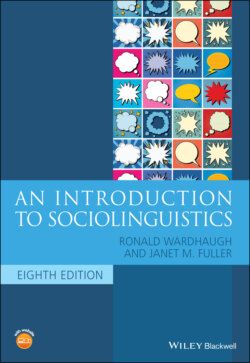Читать книгу An Introduction to Sociolinguistics - Ronald Wardhaugh, Janet M. Fuller - Страница 43
The standard as an abstraction
ОглавлениеWe have noted that recent sociolinguistic scholarship challenges the idea of languages as clearly demarcated linguistic systems; the idea that standardized languages cannot be objectively defined has a much longer history. Lippi‐Green (2012) writes about ‘the standard language myth,’ and Crowley (2003) discussed the standard as an ‘idealized language.’ One of the points Lippi‐Green makes is that most people (i.e., non‐linguists) feel strongly that they know what the standard language is ‘much in the same way that most people could draw a unicorn, or describe a being from Star Trek’s planet Vulcan, or tell us who King Arthur was and why he needed a Round Table’ (Lippi‐Green 2012, 57).
Lippi‐Green also states that we see the standard as a uniform way of speaking; although some regional variation might be allowed (see below for further discussion), social variation is not considered acceptable within anything labeled as the standard. Furthermore, once we have such a codification of the language we tend to see standardization as the end result of a process. Change, therefore, should be resisted since it can only undo what has been done so laboriously. The standardized variety is also often regarded as the natural, proper, and fitting language of those who use – or should use – it. It is part of their heritage and identity, something to be protected, possibly even revered. Milroy (2001, 537) characterizes the resulting ideology as follows: ‘The canonical form of the language is a precious inheritance that has been built up over the generations, not by the millions of native speakers, but by a select few who have lavished loving care upon it, polishing, refining, and enriching it until it has become a fine instrument of expression (often these are thought to be literary figures, such as Shakespeare). This is a view held by people in many walks of life, including plumbers, politicians and professors of literature. It is believed that if the canonical variety is not universally supported and protected, the language will inevitably decline and decay.’
This association with the standard as simultaneously the goal of all and something which is created by (and accessible to) only the educated elite is also noted by Lippi‐Green. She further points out that what is meant by ‘educated’ is never specified; indeed, it is quite circular, as we define the standard as the speech of educated people and educated people as speaking the standard. But the role of the standard in education is quite strong; it is the variety that is taught to both native and non‐native speakers of the language (see chapter 12 for more discussion of this).
